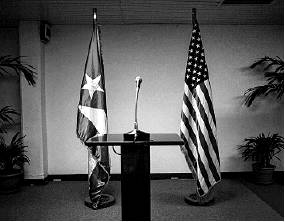Haves and Havana
Recent sanctions on Cuba threaten to derail promising cooperation and hurt Texas, too.
Until recently, an end to decades of hostilities between the United States and the Caribbean island of Cuba appeared imminent, and prospects for Texas reaping enormous benefits from that thawing of tensions held great promise.
Texas farmers were eagerly anticipating the possibility of increasing exports of poultry, corn, soybeans, wheat and rice to the island nation. Nonstop flights between Bush Intercontinental Airport and Havana were available to the public before the end of 2016, and the U.S. and Cuban flags were flying atop reopened embassies in Havana and Washington after full diplomatic ties were restored for the first time in 50 years.
Gov. Greg Abbott visited Cuba in late 2015, when he touted Texas’ abundance of easily available exports to Cuba. Months later, a delegation from Houston led by Mayor Sylvester Turner and local corporate leaders deepened local ties to Cuba. That 2016 trip also set the stage to explore opportunities in such areas as health care, energy, trade and the arts and played a part in Houston securing next year’s World Petroleum Congress.
The death of Fidel Castro in November 2016 only seemed to cement expectations that a new, more cooperative future lay ahead. But just three years later, all that promise appears stalled — and Texas is poorer for it. Better relations with Cuba had been a hallmark of President Obama’s administration, perhaps one reason they have found no ally in his successor, President Trump.
On April 17, Trump’s National Security Adviser John Bolton announced the U.S. will impose new sanctions and other punitive measures on Cuba and Venezuela, seeking to ratchet up U.S. pressure on Havana to end its support for Venezuela’s discredited socialist president, Nicolas Maduro. The timing of Bolton’s announcement wasn’t happenstance. It was made on the 58th anniversary of the disastrous CIA-sponsored Bay of Pigs invasion and clearly served as a nod to those anti-Castro hardliners and Trump supporters in South Florida. The new sanctions include restrictions on non-family travel to Cuba, reductions in remittances to Cuba to $1,000 per person per quarter, and authorized Cuban-Americans and other U.S. citizens to sue companies doing business in Cuba over property confiscated after the 1959 revolution. Last week, Exxon Mobil filed a lawsuit against Cuba’s national oil company seeking compensation for the value of assets seized when the firm was known as Standard Oil.
For Texas farmers, it’s a matter of working under current rules of trade while maintaining relationships. “We don’t expect any movement on Cuba under the current administration,” Dwight Roberts, president and CEO of the U.S. Rice Producers Association, told the editorial board. He described the recent developments as “depressing.” U.S. companies exported close to $230 million worth of agricultural goods to Cuba in 2018, down an estimated 18 percent from the year before, according to Cuba Standard , an independent news site covering political and economic news in Cuba.
Felix Chevalier, a Houston lawyer of Cuban descent who represents U.S. firms internationally, told the editorial board that he remains hopeful. “Despite the current circumstances, it’s inevitable the U.S. and Cuba will normalize relations and Houston is well positioned to benefit. It’s a matter of time before the politics become current with the perspective of the majority of Americans, Cubans and the business community.”
Cuba’s brand of governing has been a failure. Shortages of food and electricity are the norm, and the government routinely abuses human rights and stifles dissent. Its people deserve liberty.
Unfortunately, new sanctions on travel won’t help address any of that. They will punish Cuban entrepreneurs, since fewer Americans will be patronizing their restaurants and shops. A reduction in remittances will directly impact Cubans who rely on family in the U.S. for support. That doesn’t seem like a strategy to win the hearts of the Cuban people, or to secure for U.S. exporters the valuable market the nation could become.
As the Trump administration tightens the screws on Cuba, we urge U.S. Sens. John Cornyn and Ted Cruz as well as other members of the Texas congressional delegation and the Texas Legislature to raise their voices to remind the president that ties to Cuba, especially in trade, offer enormous opportunities for Texas. The sooner we strengthen those ties, the better.
